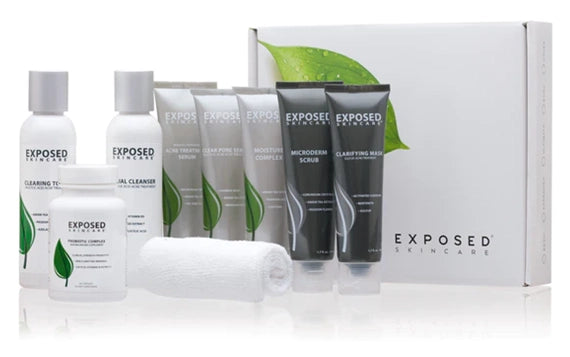Chicking is one of the most consumed meat. So, it is normal to ask the question: does chicken cause acne? The idea that our diet plays a significant role in skin health is far from new, yet the connection between specific foods like chicken and acne is a topic that often leaves us scratching our heads.
In this in-depth article, we'll explore whether chicken is a silent culprit behind acne, examine the nutritional aspects, and look at other foods that might worsen your skin condition.
Also read: How to choose the best acne treatment
Biggest Take-Aways:
- Diet plays a significant role in acne management, but it's not the sole factor.
- Although some components of chicken can cause acne, it is not as severe as you may think.
- High-glycemic foods, certain proteins, and omega-6 fats can aggravate the skin and contribute to acne.
- Exposed Skin Care offers a comprehensive regimen that works in tandem with a balanced diet to manage and reduce acne effectively.

The Anatomy of Acne: What Really Happens?
Before delving into whether chicken can cause acne, it's essential to understand what acne is. Acne vulgaris is a skin condition characterized by the appearance of pimples, blackheads, and whiteheads.
The skin's oil glands and hair follicles get clogged with oil and dead skin cells, leading to inflammation and acne lesions.
How Diet Affects Acne
Various elements contribute to acne, including hormone levels, sebum production, and even your genetic makeup. The role of diet in the prevalence of acne is becoming increasingly clear.
For instance, foods with high glycemic index can cause a rapid spike in blood sugar levels, which can stimulate the skin's oil glands and make acne breakouts more likely.
Foods that cause inflammation are often considered the villains behind acne breakouts. Inflammation is a biological response to harmful stimuli, and it can wreak havoc on your skin. High-glycemic foods, processed foods, and certain meat products can cause inflammation that may exacerbate acne symptoms.
Does Chicken Cause Acne: The Protein Dilemma
Proteins are the building blocks of our body, and chicken is a popular source of this vital nutrient. But does chicken cause acne due to its protein content?
Amino Acids and Acne
Chicken contains essential amino acids, which are necessary for various bodily functions. However, it's worth noting that some amino acids, like leucine, can increase insulin levels. Elevated insulin can stimulate sebum production and increase the risk of acne.

Cooking Methods Matter
Not all chicken dishes are created equal. Fried food, especially fried chicken, is high in omega-6 fats that can lead to increased inflammation in the body. The cooking oils used for frying can cause acne breakouts and worsen the severity of acne lesions.
Yogurt and Chicken: A Double Whammy?
Many people enjoy pairing chicken with a side of yogurt. While yogurt is generally considered healthy, certain types can actually aggravate acne. High sugar content and additives in flavored yogurts can increase blood sugar levels and contribute to the development of acne.
Chicken Versus Other Meats
If you're trying to keep your skin clear, you might wonder how chicken stacks up against other meats like beef. One study showed that red meat might increase inflammation levels, increasing acne development.
Chicken, being leaner, often seems like a healthier alternative. However, both types of meat contain high levels of amino acids that could increase sebum production.
Eggs: An Unlikely Foe?
Speaking of protein sources, eggs have also been implicated in discussions about foods that trigger acne. Like chicken, eggs contain amino acids that can elevate insulin levels and, therefore, may increase the risk of acne.

The Balanced Diet for Skin Health
Understanding the relationship between food and acne can help you make better dietary choices for skin health. Incorporating foods that prevent acne into your diet can be a proactive way to manage acne breakouts.
Whole Grains Over Refined Grains
Whole grains have a lower glycemic index compared to refined grains. This means they are less likely to spike blood sugar levels and trigger acne.
The Power of Omega-3s
Omega-3 fatty acids are excellent for reducing inflammation in the body, which can help with the appearance of acne. Foods rich in Omega-3s include fish, chia seeds, and flaxseeds.
Fruits and Vegetables: The Natural Detoxifiers
High in antioxidants, fruits and vegetables can improve skin health by fighting off free radicals that cause inflammation and acne.
The Benefits of Using Exposed Skin Care in Your Acne Management Journey
While understanding the connection between acne and diet is crucial, proper skin care should not be overlooked. Exposed Skin Care offers an effective strategy in combating acne, working hand-in-hand with your dietary changes.
Here's how Exposed Skin Care can benefit you:
- Targeted Treatment: Exposed Skin Care products are formulated to deal directly with the root cause of acne. This means they go beyond just reducing surface blemishes; they penetrate deeper to manage the biological processes that stimulate the skin's oil glands.
- Comprehensive Care: Patients with acne often wonder about the relationship between food intake and skin condition. Is milk causing your breakouts? Do eggs cause acne? While the answer to these questions might vary, Exposed Skin Care works to reduce acne regardless of the specific triggers.
- Holistic Approach: Acne also affects your skin and hair health. Our products contain balanced ingredients that target acne and enhance the overall health of your skin and hair.
Remember, achieving clear is a holistic approach involving diet and the right skin care regimen. With Exposed Skin Care, you can confidently navigate the complexities of diet and acne, ensuring a proactive way of managing your skin's health.
Conclusion
Acne management often feels like a never-ending maze, especially when considering the role of diet. From milk and its debated link to acne to foods like beef and chicken rich in proteins and amino acids, the question remains: do certain foods directly cause acne?
It's crucial to remember that while diet plays a role, it's not food that causes those unwanted breakouts. Products with high levels of omega-6 and an amino acid called leucine found in certain proteins can aggravate the skin.
Noticing acne after consuming milk or foods that contain high levels of certain amino acids may not be coincidental. But again, these are just pieces of a larger puzzle.
Foods that aggravate the skin can worsen acne but are not usually the root cause. Adopting a holistic approach to skin care is equally crucial. This is why you need a comprehensive skincare routine. Products like Exposed Skin Care can work synergistically with a balanced diet to manage and reduce acne. It offers a well-rounded strategy for tackling acne at its root.
Ultimately, it's about balancing what you consume and how you care for your skin, offering a more nuanced understanding of the complex relationship between food and acne.
FAQs
Does chicken directly cause acne?
No, chicken itself doesn't directly cause acne, but how it's prepared and what it's combined with can contribute to acne.
What foods should I avoid to prevent acne?
Foods high in carbohydrates, high levels of omega-6 fats, and certain dairy products like milk may aggravate the skin and contribute to acne.
Is food the only factor that contributes to acne?
No, food alone is not the only factor. Hormone levels, sebum production, and other external factors also contribute to acne.
What is the role of amino acids like leucine in acne?
Leucine can stimulate the skin's oil glands, which can aggravate acne. It's found in proteins like beef and chicken.
How can Exposed Skin Care help?
Exposed Skin Care products are formulated to target the root causes of acne directly, and they work synergistically with a balanced diet to manage and reduce acne.


















